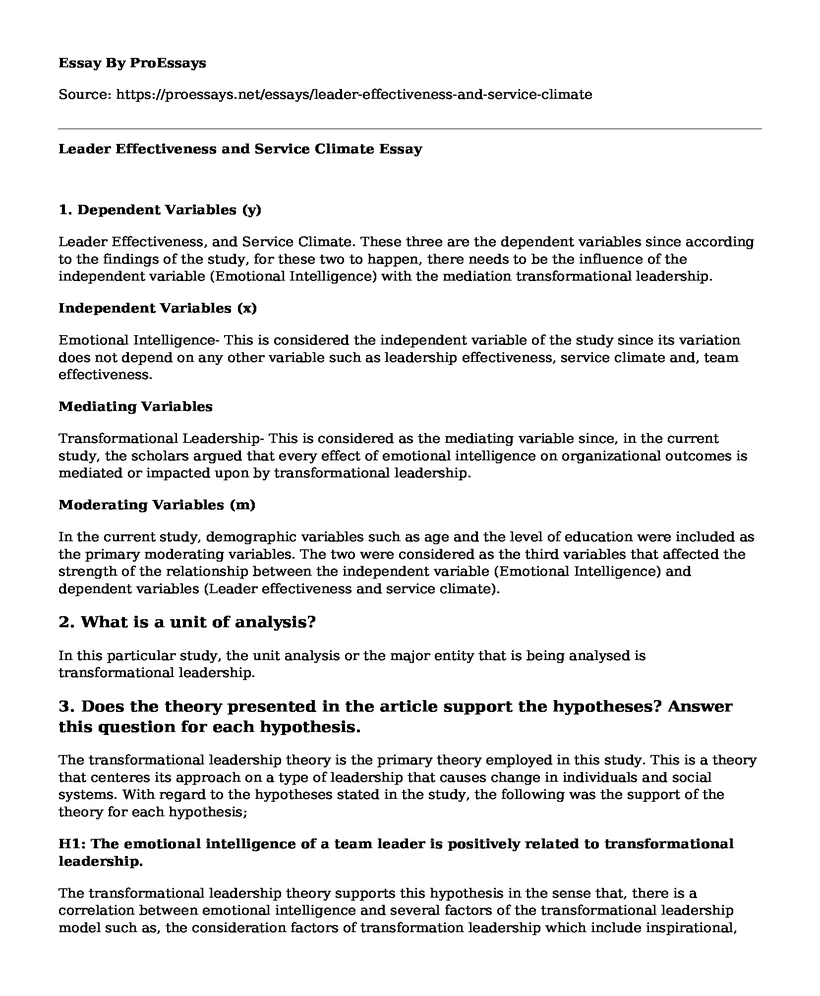1. Dependent Variables (y)
Leader Effectiveness, and Service Climate. These three are the dependent variables since according to the findings of the study, for these two to happen, there needs to be the influence of the independent variable (Emotional Intelligence) with the mediation transformational leadership.
Independent Variables (x)
Emotional Intelligence- This is considered the independent variable of the study since its variation does not depend on any other variable such as leadership effectiveness, service climate and, team effectiveness.
Mediating Variables
Transformational Leadership- This is considered as the mediating variable since, in the current study, the scholars argued that every effect of emotional intelligence on organizational outcomes is mediated or impacted upon by transformational leadership.
Moderating Variables (m)
In the current study, demographic variables such as age and the level of education were included as the primary moderating variables. The two were considered as the third variables that affected the strength of the relationship between the independent variable (Emotional Intelligence) and dependent variables (Leader effectiveness and service climate).
2. What is a unit of analysis?
In this particular study, the unit analysis or the major entity that is being analysed is transformational leadership.
3. Does the theory presented in the article support the hypotheses? Answer this question for each hypothesis.
The transformational leadership theory is the primary theory employed in this study. This is a theory that centeres its approach on a type of leadership that causes change in individuals and social systems. With regard to the hypotheses stated in the study, the following was the support of the theory for each hypothesis;
H1: The emotional intelligence of a team leader is positively related to transformational leadership.
The transformational leadership theory supports this hypothesis in the sense that, there is a correlation between emotional intelligence and several factors of the transformational leadership model such as, the consideration factors of transformation leadership which include inspirational, individualized, and motivational factors.
H2: Transformational leadership is positively related to leader effectiveness, team effectiveness and service climate.
According to the current study, the transformational leadership theory supports this hypothesis since, a positive relation was identified between transformational leadership; leader effectiveness and service climate. However, this was exclusive pf the team effectiveness.
H3: Transformational leadership mediates the relationship between emotional intelligence and leader effectiveness, team effectiveness and service climate.
The theory does not entirely support this hypothesis since the results of the current study substantiated that the only relationship that is facilitated by transformational leadership is that of emotional intelligence and leadership effectiveness, emotional intelligence and service climate. This, however, is not inclusive of the variable, team effectiveness.
4. Do the authors provide strong rationale for their hypotheses? (Make sure you examine that for each hypothesis).
H1: YES- I believe that the rationale that is provided under this hypothesis is strong enough, owing to the fact that the researchers referenced numerous pieces of evidence from existing literature showing the inherent relationship between emotional intelligence and transformational leadership. The hypothetical rationale provided by the researchers in this case was that of the support of this hypothesis by the transformational leadership theory.
H2: YES- Enough evidence was provided to support the close and positive relationship between transformational leadership, as the mediating variable, and the dependent variables of the study.
H3: YES- Strong rationale for this hypothesis was provided in the current study. This is evidenced by the fact that the study referenced various other existing studies which explained the reason why leaders who are considered high on emotional intelligence are more effective.
5. Discuss relevancy. Why is this study important and for whom?
This study is particularly important in the management development domain. The reason why the current study is considered relevant is owing to the fact that leaders ought to understand that they need more than the usual technical and traditional managerial skills. For them to achieve the best results in their leadership, they need quality transformational leadership competencies that will require them to exemplify emotional intelligence.
6. How were the variables measured? Discuss data collection instruments.
In the current study, dependent variables such as emotional intelligence were measured using the Wong and Law Emotional Intelligence Scale (WLEIS). On the other hand, the mediating variable, the transformational leadership among the team leaders was assessed using The Multifactor Leadership Questionnaire (MLQ-Form 5X-Short). The perceive leadership effectiveness in this study was assessed and measured using four items from the drawn from the Multifactor Leadership Questionnaire. The Global Service Climate Scale, an eight item scale was used to assess the service climate variable. Finally, the full range of team effectiveness, as a dependent variable, was measured using eight items from three different effectiveness scales.
The Data Collection Instruments
The following were the data collection instruments used:
- WLEIS
- Multifactor Leadership Questionnaire (MLQ)
- The Global Service Climate Scale
7. Are the measures that were used in the study valid and reliable? Where is the proof for that in the article?
The different measures that were to measure the variables in the current study were considered both valid and reliable. In the article, this is evidenced under the results and the discussions where the scholars reference the various measurement strategies employed in the study in when giving the results to their initially stipulated hypotheses.
Cite this page
Leader Effectiveness and Service Climate . (2022, Apr 04). Retrieved from https://proessays.net/essays/leader-effectiveness-and-service-climate
If you are the original author of this essay and no longer wish to have it published on the ProEssays website, please click below to request its removal:
- Cost Management and Strategic Decision Making
- The Strategic Plan of the Tekno Electricals Company. Essay Sample.
- Shared Leadership Essay
- Essay Sample on Embracing Change in Leadership & Nursing: Maximizing Quality
- Essay Sample on DaVita's Strategy: Attention to Detail, Teamwork and Compensation
- Leadership: Ethical vs. Unethical - Essay Sample
- Essay Sample on Maximizing Performance: How to Convince Your Employer to Favor You







